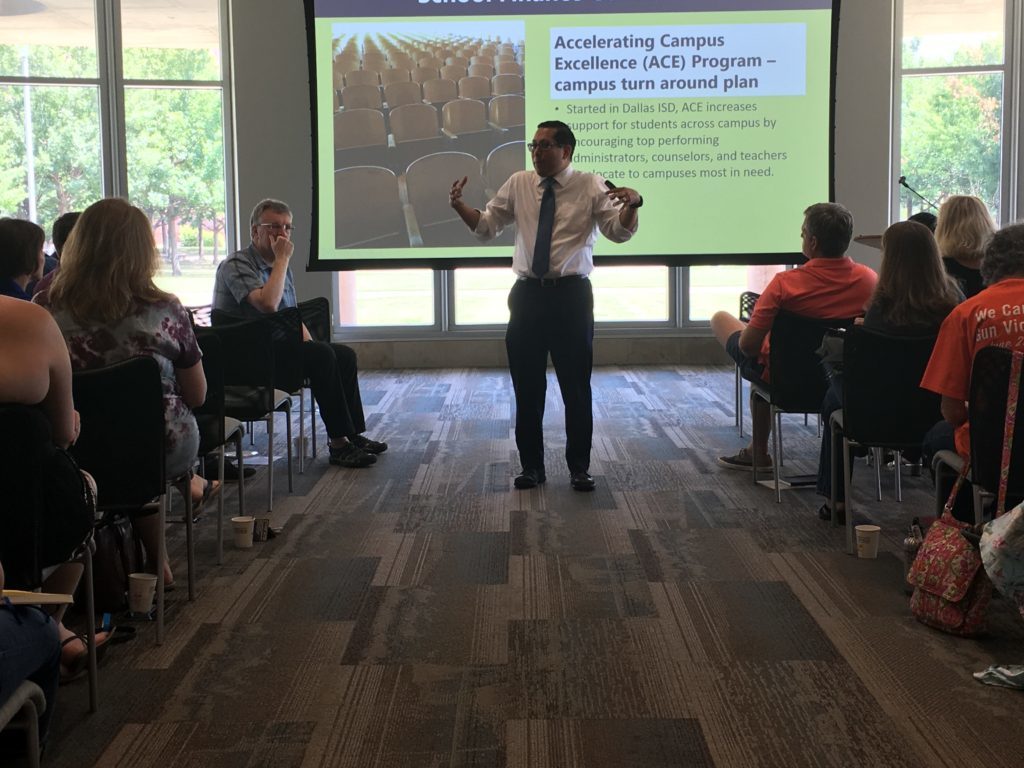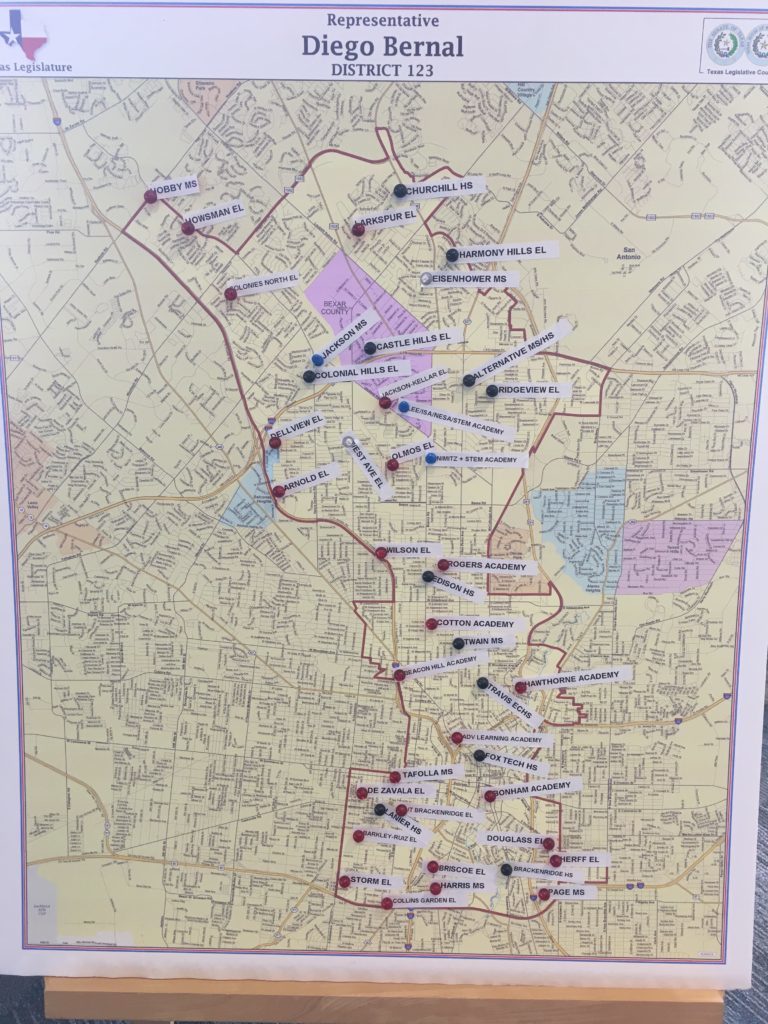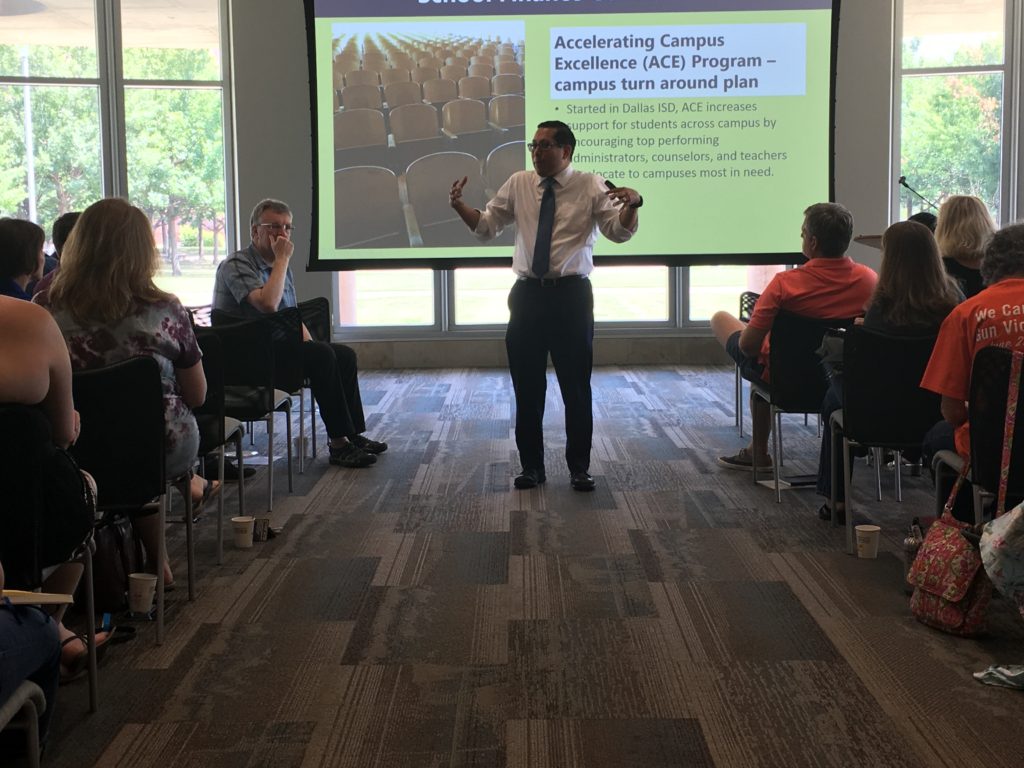Note from SA Charter Moms: We are proud to share guest posts from hallmonitor covering San Antonio’s public schools.

Schools are notoriously appealing places to showcase a political agenda. People freak out about both kids and misspent taxes, so politicians often pick their fights in the schoolyard.
Far less often does legislation address the battles that teachers are actually fighting day in and day out, but State Rep. Diego Bernal (D-123) had a fairly successful legislative session in 2017 by doing just that.
Senate Bill 725 (the Senate version of Bernal’s house bill was the version that passed) helped schools eliminate food waste and get extra food into the hands (and mouths) of kids who need it. It allows schools to save unopened food and fruit and redistribute them through “share tables” and similar mechanisms.
Teachers, Bernal said, told him that “the kids started using this the moment they put it out there.”
House Bill 3593 capitalized on the cybersecurity zeitgeist to get more technology into low income campuses with fewer lab resources, and where students might not have computers or internet at home.
House Bill 657 requires school leadership to consult with the parents of special education students before having students retake their state assessments. In the past students would automatically be re-tested—even when there was no reasonable expectation of their passing— which can be both stressful and demoralizing.
Bernal got the idea for the bills by listening to teachers and principals. Ahead of the 2017 legislature, he visited every single ISD campus in his district, as well as many charter and private schools. He even met with homeschool groups. He’s now done it again in preparation for the 2019 legislative session. It’s a novel idea, sure, listening to professionals, but it’s one that could help Bernal draft bills designed to address problems, not create them. (Whether or not he’s successful is up to teachers to decide.)
Bernal presented his findings, along with some of what he learned on the governor’s Commission on Texas Public School Finance, to a group of constituents and educators on July 21. He called it “What They Said 2.0” after the white paper he published on Medium in 2016, after the first round of school visits.
This time, Bernal said, he did it with the goal of going for “depth and dimension” on many the same issues educators brought up two years ago. Their concerns certainly have not changed, Bernal acknowledged, but every pass at a solution should get them closer to the target. He’s looking for themes and common concerns across income levels and neighborhoods. These are the issues that are most likely to gain meaningful traction in the legislature, Bernal explained. He warned that even the slightest whiff of “welfare” will send some conservative lawmakers running, as in the case of the shared food bill, SB 725. While he did manage to appeal to the frugality of Republicans with his food-sharing bill, “[Texas Agriculture Commissioner] Sid Miller fought us on this bill,” Bernal said.
In this round of visits, Bernal was able to get deeper insight into the effects of the digital divide, student attendance, high quality pre-K, and mental health services (or lack thereof).
Like his cybersecurity bill, Bernal is hoping to find broadly appealing policies with outsized benefits for the campuses that need it most. As an alumnus of Tafolla Middle School in San Antonio ISD, he understands how issues like hunger, mobility, and lack of access to internet are amplified on campuses where poverty is highly concentrated. Students coming from low-income households don’t always have internet at home, and they aren’t in control of their attendance. Many come into kindergarten already behind, and few have access to mental health care when they need it. He is looking for universally beneficial ways to address these issues, and some aisle-crossing heartstrings to pluck. Or at least some Republican-friendly angles.
Bernal has said before that he’s looking to get things done, and he can’t do that with his fist in the air (though on some issues, his fist is still in the air, sometimes literally). He really wants to get more resources in the hands of teachers, so he’s strategizing. The idealists in his corner might be content to wait until every bill is perfect, he says, but there’s food in bellies where it wasn’t before, so he’s sleeping okay at night.
“We lose too many kids by waiting,” he said after the event. “Help as much as you can as often as you can.”
Texans can expect some other education bills from Bernal as well, inspired by testimony from the school finance commission hearings. One of those, the Accelerating Campus Excellence (ACE) program, specifically aims at getting high performing teachers into high-need campuses. This is the program used by Dallas ISD to turn around some of its chronically low-performing schools, one of which out-scored its fifth grade counterpart in affluent Highland Park. The ACE model pays teachers significantly more, and requires more hours, more services, and more staff at the school.
It’s one of Dallas ISD’s most effective initiatives, but as superintendent Michael Hinojosa testified before the school finance commission, it’s bleeding the district dry. The initiative needs state funding.

There’s no doubt Bernal will face an uphill battle on any proposal that increases spending, but he doesn’t buy the “we don’t have the money” argument.
“We find ways to fund all kinds of stuff,” Bernal said.
The real battle, he knows, is getting conservative lawmakers to acknowledge that there are some challenges associated with poverty that personal responsibility can’t address. But he’s ready to strategize. For instance, in arguing that funding formulas should be based on enrollment, not attendance, he points out that an elementary schooler has little control over whether or not they are at school. He can make a strong case that at the elementary level, taking funding away from schools with chronically absent populations is like kicking them when they are down. At the high school level, lawmakers start expecting other people’s kids to act like autonomous adults.
When audience members asked how the state would hold schools accountable to promote high attendance, Bernal pointed to elements of the state accountability rubric that measure attendance. (Also, any teacher will tell you that, as long as academic performance matters, attendance will matter, and schools will incentivize it.)
This sort of community feedback is not necessarily part of Bernal’s listening tour when it comes to educational issues, he said. He’s ready to receive it, but when it comes to laws that affect schools, he wants to defer to teachers.
“Whether you like what I’m saying or not, doesn’t make it less true,” Bernal said, and if community members disagree, they should take it up with the teachers and principals of House District 123.
Originally published as “Diego Bernal preps for 2019 with ‘What They Said 2.0’,” Hall Monitor, July 21, 2018
Read more:
- “‘Recaptured & Redirected’: A Panel Discussion on Public School Finance,” Inga Cotton, San Antonio Charter Moms, August 12, 2018
- “[Hall Monitor] Texas Commission on Public School Finance: The Road to Byzantium,” San Antonio Charter Moms, March 29, 2018
- “[Hall Monitor] Texas Commission on Public School Finance: Time Is Money . . . and Some Kids Don’t Have Either,” San Antonio Charter Moms, March 21, 2018
- “[Hall Monitor] Texas School Finance Commission: You Get the Teacher You Pay For,” San Antonio Charter Moms, March 16, 2018
- “What They Said: What I Learned from Conversations with Texas Educators,” Diego Bernal, Medium, August 16, 2016
